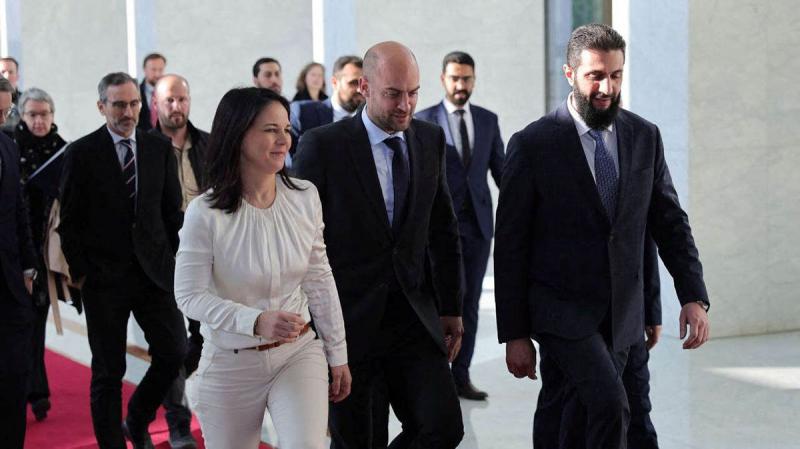
Damascus, Syria – In a landmark visit, German Foreign Minister Annalena Baerbock and French Foreign Minister Jean-Noel Barrot met with Ahmed al-Sharaa, the de facto leader of Syria, marking the first visit by European ministers since rebels seized control of Damascus on December 8, 2024. The ministers emphasized the crucial need for inclusion of all Syrian groups, including women and minorities like the Kurds, in the country’s transition to a new political order.
The visit comes after the ousting of President Bashar al-Assad, ending his family’s decades-long rule. The European delegation aimed to establish a cautious dialogue with the new leadership under Sharaa’s Hayat Tahrir al-Sham (HTS), a former Al-Qaeda affiliate, while stressing the importance of moderation and respect for minority rights.
Baerbock stated that European support and potential funding would depend on demonstrable political progress, including the inclusion of all ethnic groups in the transition to democracy. She expressed hope for a future of freedom for all Syrians, regardless of origin, gender, or religion, but acknowledged the uncertainty of the situation.
Key Points of Discussion:
- Minority Rights and Inclusion: The ministers explicitly stressed the need to protect all civilians and minorities, particularly the Kurds, whose security was deemed essential for a peaceful Syria. Barrot also met with Christian leaders, assuring them of France’s commitment to a pluralistic Syria with equal rights for all.
- Political Transition: The European delegation urged a peaceful transition and offered technical assistance in drafting a new constitution. Barrot reported “progress” in talks with Sharaa, securing assurances of broad participation in the political transition, “notably among women.”
- Kurdish Integration: Barrot called for a political solution for Kurdish fighters to be integrated into the Syrian state and urged a permanent ceasefire in the north, where Turkish-backed factions have been attacking the Kurdish-led Syrian Democratic Forces (SDF). Baerbock also urged Syria’s neighbors to respect its territorial integrity and sovereignty.
- Sanctions and Diplomatic Presence: While Baerbock acknowledged “some positive signs,” she stated it was too early to discuss lifting EU sanctions. Barrot visited the closed French embassy and indicated France’s intention to re-establish diplomatic representation when conditions allow.
- Transparency and Accountability: The ministers also visited the notorious Sednaya prison, a symbol of past human rights abuses.
Challenges and Concerns:
Despite the focus on inclusion, concerns remain about HTS’s past affiliations with extremist groups and its commitment to protecting minority rights. Protests by Christian communities following incidents like the burning of a Christmas tree highlight these concerns. Furthermore, the complex geopolitical landscape, with competing interests from Turkey and Russia, presents additional challenges to Syria’s future.
Looking Ahead:
The European ministers’ visit represents a significant step towards engagement with Syria’s new leadership. While emphasizing the need for concrete actions to ensure inclusivity and protect minority rights, they offered a cautiously optimistic outlook for a peaceful transition. The international community will be closely watching Syria’s next steps as it navigates this critical period.